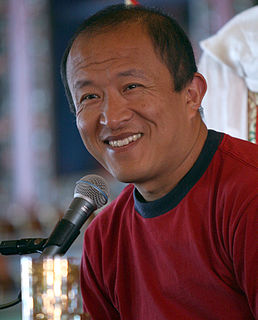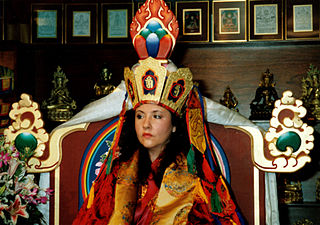A Quote by Sogyal Rinpoche
At every moment in our lives we need compassion, but what more urgent moment could there be than when we are dying? What more wonderful and consoling gift could you give to dying people than the knowledge that they are being prayed for, and that you are taking on their suffering and purifying their negative karma through your practice for them?
Related Quotes
At the moment of death, there are two things that count: whatever we have done in our lives, and what state of mind we are in at that very moment. Even if we have accumulated a lot of negative karma, if we are able to make a real change of heart at the moment of death, it can decisively influence our future, and transform our karma, for the moment of death is an exceptionally powerful opportunity to purify karma.
Every man gives his life for what he believes. Every woman gives her life for what she believes. Sometimes people believe in little or nothing, nevertheless they give up their lives to that little or nothing. One life is all we have, and we live it as we believe in living it, and then it's gone. But to surrender what you are, and live without belief - that's more terrible than dying - more terrible than dying young.
We are seeing, then, that our experience is altogether momentary. From one point of view, each moment is so elusive and so brief that we cannot even think about it before it has gone. From another point of view, this moment is always here, since we know no other moment than the present moment. It is always dying, always becoming past more rapidly than imagination can conceive. Yet at the same time it is always being born, always new, emerging just as rapidly from that complete unknown we call the future. Thinking about it almost makes you breathless.
When one existentially awakens from within, the relation of birth-and-death is not seen as a sequential change from the former to the latter. Rather, living as it is, is no more than dying, and at the same time there is no living separate from dying. This means that life itself is death and death itself is life. That is, we do not shift sequentially from birth to death, but undergo living-dying in each and every moment.
More than anything, the journal wanted. It wanted more than it could hold, more than words could describe, more than diagrams could illustrate. Longing burst from the pages, in every frantic line and every hectic sketch and every dark-printed definition. There was something pained and melancholy about it.
It now lately sometimes seemed a black miracle to me that people could actually care deeply about a subject or pursuit, and could go on caring this way for years on end. Could dedicate their entire lives to it. It seemed admirable and at the same time pathetic. We are all dying to give our lives away to something, maybe.
Men who have lived significant lives are men who never waited: not for money, security, ease, or women. Feel what you want to give most as a gift, to your woman and to the world, and do what you can to give it today. Every moment waited is a moment wasted, and each wasted moment degrades your clarity of purpose.
Through compassion it is possible to recognize that the craving for love that people feel resides also in our own hearts, that the cruelty the world knows all too well is also rooted in our own impulses. Through compassion we also sense our hope for forgiveness in our friends' eyes and our hatred in their bitter mouths. When they kill, we know that we could have done it; when they give life, we know that we can do the same. For a compassionate person nothing human is alien: no joy and no sorrow, no way of living and no way of dying.
Ask yourself these two questions: Do I remember at every moment that I am dying, and that everyone and everything else is, and so treat all beings at all times with compassion? Has my understanding of death and impermanence become so keen and so urgent that I am devoting every second to the pursuit of enlightenment? If you can answer "yes" to both of these, then you really understand impermanence.
Samsara-the Wheel of Existence, literally, the "Perpetual Wandering"-is the name by which is designated the sea of life ever restlessly heaving up and down, the symbol of this continuous process of ever again and again being born, growing old, suffering, and dying. (It) is constantly changing from moment to moment, (as lives) follow continuously one upon the other through inconceivable periods of time. Of this Samsara, a single lifetime constitutes only a vanishingly tiny fraction.
Knowledge of Rome must be physical, sweated into the system, worked up into the brain through the thinning shoe-leather. ... When it comes to knowing, the senses are more honest than the intelligence. Nothing is more real than the first wall you lean up against sobbing with exhaustion. Rome no more than beheld (that is, taken in through the eyes only) could still be a masterpiece in cardboard - the eye I suppose being of all the organs the most easily infatuated and then jaded and so tricked. Seeing is pleasure, but not knowledge.
















